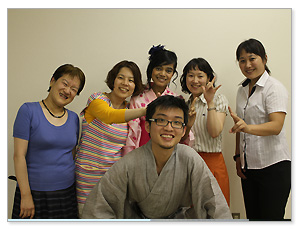- HOME
- Alumni News
- Kok Sheng Chan (12th trainee)
- Kok Sheng's Final Report
Kok Sheng's Final Report
Discovering the New Deaf World
The Journey to the New World: August 31, 2010
Before coming to Japan, I used to work for a company but I was not happy with the work and felt lonely in office because of discrimination—for example, there were times that I was excluded from meetings as my colleagues saw no point of having me, who had hearing impairment. I also worked as a committee member for Society Deaf of the Johor (SDJO). I saw many deaf people facing problems, and they wanted me to participate in the Duskin Leadership Training Program to solve these problems. I was interested in the program also because I knew that it would bring me new life experiences. When I was selected, I could not believe it because I had never been selected for any of such programs in Malaysia. My family offered me full support and, in particular, my loving wife was very supportive of me. My whole family and about twenty friends saw me off at the airport. I was worried about communication in the Japanese language so I tried reading a textbook in the airplane. But it was difficult to memorize words, and everybody else was already asleep. I was the only one who was awake and had a reading light on. The next morning, I arrived in Osaka, Japan. From the airplane I saw many small yachts and boats. The sea and sunrise were very beautiful. The city buildings looked very clean. I met Nasu san and everybody else at the airport. They were very helpful and polite to me.
Three Months of Japanese Language Course
We studied the Japanese language and sign language. At first I thought that we were going to study Hiragana and Katakana only. I was surprised that Kanji was also included. I worked hard on my Japanese because I found it interesting. My Japanese language Senseis (teachers) had very good teaching skills. I could easily understand what they taught and learned smoothly. Especially, I cannot forget Sato Sensei, who was funny and we laughed a lot. Everyday I cracked jokes with my Senseis. I can now read Hiragana, Katakana and also Kanji. My special thanks go to my teachers. The Japanese sign language was very easy to memorize and interesting. I particularly thank Sueki Sensei because he always introduced me and Thinzar to his friends so that we could learn communication in the Japanese sign language. His friends also taught me about cultural differences in Japan. Japanese became my second language. I changed some of my habits and adapted to the Japanese culture.
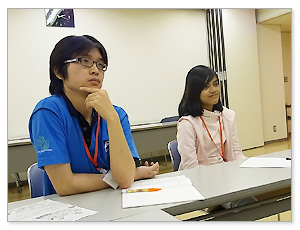
Sweet Memories
1. Home stay
I had a week’s holiday and stayed with my host family. It was wonderful. I stayed with the warm Harada family in Nagasaki Prefecture. Mr. and Mrs. Harada felt like my parents during that week. I had many experiences in Nagasaki. I drew the word “DUSKIN” on the snow. They asked me if I wasn’t cold, and I said I was not because I was enjoying myself. We also made mochi rice (sticky rice balls) at the house of my hot family. It was very interesting to shape mochi like the moon. They took me to an expensive restaurant for the New Year and ordered a dish of living prawns. They laughed as I was scared to eat living prawns – I had never tried them before – but they were delicious! They also took me to a sulphuric hot spring. It was very smelly but very comfortable. They took me everywhere around Nagasaki and Oita Prefectures for sightseeing. I went to Oita for Onsen (hot spring), which was a very good experience. I admired the late Edo-era hero Ryoma Sakamoto and I wish to become a leader like him in the future, because he was good at finance and economics and had many visions for people. My host parents were sometimes bickering, but they were a very kind and warm-hearted couple. I especially thank my host dad and mum for taking care of me for the week for the new experiences they gave me. I won’t forget them.
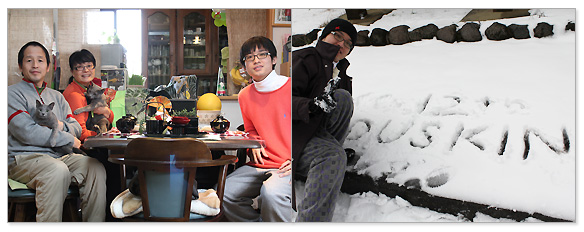
2. Skiing
We skied in Echigo Yuzawa in Niigata Prefecture – I had never skied before. Our ski trainer taught me how to keep the knees flexible and keep my body low. The ski trainers were highly professional and communicated using gestures. I fell many times, but it did not hurt and was actually enjoyable. I managed to ski smoothly after that. Our ski trainer then brought me to a higher plain. I was very scared and thought that I was going to fall down to the road and die. Ha ha! My trainer cracked jokes with me during the exercise. After a while I could ski by myself. In my dreams, I can beat my ski trainer! Ha ha! Next time I see my ski trainer I would like to ask him to teach my wife and son. The seven of us with trainers enjoyed ourselves very much and threw snow balls at one another, and also at Akiko san. It became an unforgettable memory.
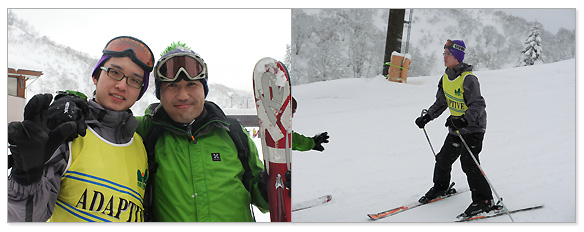
Discovery of the New Deaf! Presentation skills at JASS in Tokyo
I practiced my presentation skills for 19 days, which would be very useful in my future. Kumiko Sensei was strict but very thorough and keen, it was a wonderful opportunity to learn and my presentation skills improved. The other teacher, Setsuko Sensei, was very kind and helpful, and corrected my grammar. She also encouraged me to be patient when I got sad, so I practiced patiently until I improved. I was given the responsibility to plan and organize a presentation and event, called “Johor deaf talks” – which was about Johor and deaf people in Johor – and “the Chinese New Year” that is part of Malaysian culture. These activities were successful. Twenty five deaf people came to see my activities, which made me very nervous, and it felt as if they were my examiners. Two days later, I received good results for my activities, thanks to the guidance from Kumiko Sensei and Setsuko Sensei, even though I had made a number of mistakes, which I will continue to challenge. I won’t forget my Senseis. My special thanks go to Setsuko Sensei for encouraging me to keep positive.
Association of the Deaf
Two weeks is so short for a training program I went to Osaka Association of the Deaf. The Association has many centers and organizations and I had wonderful learning activities. I also strongly began to feel that I wanted to start an organization in Johor like Osaka Association. I visited many places, among which an old deaf people’s home in Osaka was the biggest place. Many elderly people were living there. They told me that I looked Japanese. I also attended many workshops, which were very good for deaf people and people with multiple disabilities who could not work for any other company. I was very surprised that Nissei New Creation had many disabled employees and many facilities for these people. Malaysian companies do not have such systems. I will go back to Malaysia and encourage companies to be like them.
March 3 is apparently a special “Ears” day. I joined the Osaka committee members and youth members to help them in the Ear Day Commemoration (an event to raise society’s awareness for deaf people) in Osaka on March 6. All of the committee members treated me as one of them, not a guest, something that I highly appreciated. The youth members from Osaka took me to many places around Osaka. We had a great time together and had ample amounts of Japanese sake and also built a network that I will maintain and develop when I am back in Malaysia. I thank Otake san and the youth members for helping me during my training.
The one month and a half at Hyogo Association of the Deaf was too short. I learned about Shimamoto san’s movement and the development of the youth activities. I was happy and able to exchange ideas about how to start a center. Shimamoto san took me to Association of Kyoto Rehabilitation and Treatment for People with Hearing and Speech Disorders. I was very happy because I shared with Shimamoto san many things about youth movement and organization. He is a good leader. I admire his talent. Talking with Shimamoto san, I realized how to help Johor’s society. I will make Johor’s association in similar vein to Osaka and Hyogo Association for the Deaf. The centers I visited, in Hyogo, Awaji and Osaka, all had different methods and details. I also visited Awaji Owl House as a volunteer to help the elderly. In addition, I spent time with young helpers and was surprised to know that young people could work as helpers. In Malaysia, old people’s homes do not have young staff. I was also amazed that Kinki Youth Division was very strong. Shimamoto san told me about Asia Pacific Youth section and Japanese movement. I won’t ever forget it. But I want Malaysia to adopt an organization like Kinki Youth Division. I will work toward a future and try my best. The Asia Pacific region can beat America and Europe! Go, Asia Pacific!
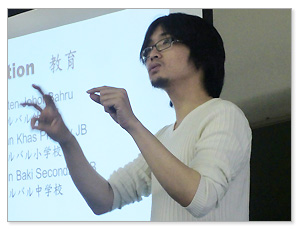
New Discovery in Education – Sign Language Teaching at Tsukuba University
Five days at Tsukuba University was very short. I learned Ohsugi Sensei’s teaching. He is a very good teacher and also a leader. I saw him teaching his students in class. His method is very strict but very good and simple. I will try to learn it. I also attended his lecture about barriers for deaf people in hotels.
Learning Sign Language at Setagaya Welfare Professional Training College and Training of Sign Language Interpreters
The two weeks at Setagaya Welfare Professional Training College seemed even shorter. Takashima Sensei taught me sign language. Takashima Sensei and Iizumi Sensei were very warm to all students. The students and teachers treated each other equally like a family. Takashima Sensei and I shared a lot about sign language. Takashima Sensei is like my father and Iizumi Sensei my mother. In the future I hope that Malaysia’s deaf people will treat sign language interpreters like their own family and I would also like to see an establishment of a Malaysian equivalent of Setagaya Welfare Professional Training College – which is engaged in not just for learning sign language but also for developing sign language interpreters.
My New Life, New Discovery, and New Goals!!
In Malaysia, I did not think about disabilities or deafness too deeply. I did not learn anything new. When I arrived in Japan, my life changed as if it had got hit by a spark. Now my heart has already changed; I want to be a leader and work at an association. Many Japanese people told me that I am Japanese. I actually enjoyed it because the experience gave me a new life in a new world. I will go to back to Malaysia and endeavor to be a good leader.
In Japan, for the first time in my life, I visited many associations, education facilities and centers. In Malaysia, I had not seen any association, center or leader. I did not care about associations because no one encouraged me. Luckily, Duskin invited me to this leadership training in Japan. I clearly remember Shimamoto Sensei’s speech. I will go back to Malaysia and develop youth movement. If I had not heard from Duskin, by no means I would have wished to become a leader in my future.
In Malaysia, I must establish an organization and face challenges. I will help young people to establish new associations. Once the young people get engaged in activities and have shown improvement, I will teach them sign language. I will then make arrangements for young people to become sign language interpreters. Finally, when all this is complete, I will establish a new organization and set up an information center for deaf people. I will then help other parts of the Asia Pacific region to start an organization. As an individual, I want to set up my own business – something like Mister Donut and a Japanese restaurant. I will try my best as I have so many goals to achieve!!
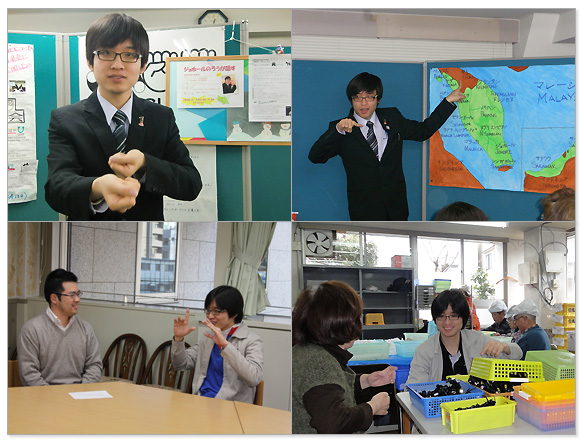
Finally, Special Thanks!
I would like to thank my new family – the Duskin Ainowa people, my family the JSPRD staff, also my beloved elder sister, Nasu san, and all who supported me during my wonderful training. I won’t forget my new life, new experiences and wonderful training ever. I wish to be a leader like Ryoma. I will go back to Malaysia and make improvements for deaf people in the country. I also specially thank my good friends in Japan who took me to all the places there. I LOVE YOU! I already treat you as my new family. Go Japan! Can I start crying now? Ha ha!
